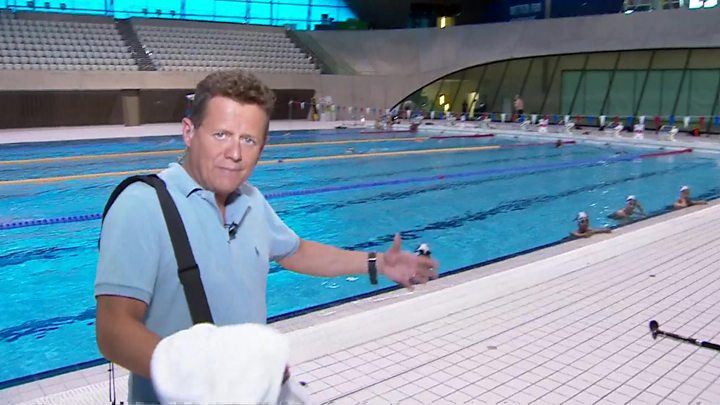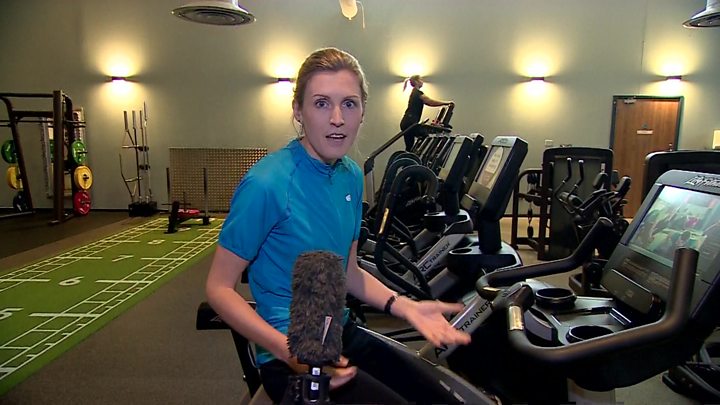
Media playback is unsupported on your device
Some indoor gyms, swimming pools and sports facilities in England have reopened for the first time since March in the latest easing of lockdown rules.
The leisure sector has warned it will still struggle because of the financial impact of the coronavirus pandemic.
At least a third of public facilities are expected to remain shut.
Gyms must follow strict hygiene and social distancing measures, such as limiting the number of people using the facility and spacing out equipment.
Facilities should also reduce class sizes and ensure adequate ventilation, according to government guidance issued earlier this month.
Indoor gyms in Northern Ireland opened earlier this month, but they remain closed in Scotland and Wales.

Media playback is unsupported on your device
Swim England has published its own guidance for operators on how to reopen indoor pools, including implementing a one-way entry and exit system.
Its chief executive Jane Nickerson said financial problems meant less than 20% of pools will reopen this weekend.
The cost of heating the pools and implementing the new guidelines, as well as the reduced footfall and fewer swimming lessons, mean many cannot afford to open, she told BBC Radio 4's Today programme.
She also called on the government to give more financial support to struggling pools, saying the money would also help with its plan to tackle obesity.
Meanwhile, Health Secretary Matt Hancock has confirmed gyms and sports facilities will not reopen in Luton or Blackburn with Darwen due to an increase in coronavirus cases in those areas.
Outdoor gyms and pools have been open in England since 4 July because there is less risk of catching coronavirus outdoors.
'It has been a struggle'
Luke Willmott, manager of the Castle Gym in Nottingham, said his gym was at capacity by about 06:25 BST, and it was "only right for people to have a choice" to return.
He said returning members are being advised to spray equipment with sanitiser before, during and after use - but there were "loads" of membership cancellations during lockdown.
"I think it's down to people's circumstances," he said. "A lot of our community have supported us which has been fantastic... but it has been a struggle."
Paul Douglas-Smith, manager of the Littlehampton Wave swimming pool, said the facility can now take 40 swimmers at once, down from more than 130 before the pandemic.
He said the pool will be hit financially, and is aiming for a "staged return".
"We're looking at the fitness swimmers first and then we're looking at the family and the junior swimming. That will probably follow in the next two or three weeks," he said.
Analysis
By Katy Austin, BBC News business correspondent
Confidence is crucial for those running gyms, pools and leisure centres - how safe people feel, and how much they're prepared to spend at a time of economic uncertainty.
Like other industries, fitness businesses have taken a financial hit. A report from trade body UKActive said membership cancellations rates were 15- 23% due to the impact of the pandemic.
Some fitness professionals have adapted by introducing online classes and personal training, which have proved popular.
But UKActive says although today is an important milestone, the sector is "not yet out of the woods".
It says support will still be needed with costs such as back-dated rent in coming months, and some facilities and services will remain closed due to the ongoing financial pressures and restrictions.
Despite the relaxed rules, industries bodies have warned many facilities could be forced to close amid the pandemic.
Community Leisure UK, the members' association that specialises in representing charitable leisure and culture trusts across England, Scotland and Wales, estimates that 48% of all public leisure facilities face closure, meaning as many as 1,300 could disappear by the end of the year, along with more than 58,000 jobs.
The organisation said about a third would not be able to reopen on Saturday due to the increased costs resulting from lost income during lockdown and due to operating at reduced capacity.
"The main reason is financial viability, because as with all of the high streets and services - zero income since the end of March," Mark Tweedie, chief executive of Community Leisure UK, said.
- PANORAMA: Lifting the lockdown in Salford
- I MAY DESTROY YOU: The groundbreaking drama making headlines in lockdown
The District Councils' Network (DCN) is also warning of the "uncertain future" faced by gyms and leisure centres, pointing out that the sector is expected to lose about £305m this year.
The DCN, which represents 187 district councils in England that provide leisure services, is calling on the Treasury to provide a rescue package to save leisure centres from collapse.
Leisure centres and indoor gyms, along with swimming pools and other indoor sports facilities were closed on 21 March as part of measures to prevent the spread of coronavirus.
Are you ready to go back to the gym? Has lockdown changed your exercise routine? Share your experiences by emailing haveyoursay@bbc.co.uk.
Please include a contact number if you are willing to speak to a BBC journalist.
https://news.google.com/__i/rss/rd/articles/CBMiJmh0dHBzOi8vd3d3LmJiYy5jby51ay9uZXdzL3VrLTUzNTM0OTE50gEqaHR0cHM6Ly93d3cuYmJjLmNvLnVrL25ld3MvYW1wL3VrLTUzNTM0OTE5?oc=5
2020-07-25 04:16:58Z
52780950009279
Tidak ada komentar:
Posting Komentar